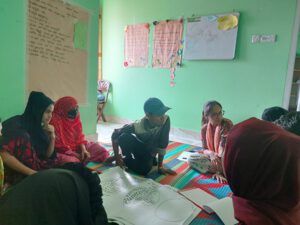
Children working in the leather industry in Dhaka decided to focus on the issue of financial management within families because of the high levels of indebtedness that sometimes force children into labour.
The children collected evidence in the community on job loss, dowry debt, inability to work due to illness and a lack of financial support from fathers. They saw these issues as key factors in having to leave their school and contribute to their family’s income.
Meeting twice a month, the group of nine children developed a theory of change which focused on three pathways to a more positive future – alternative income generating activities through capacity building, discussion within families around repayment of debts and impact of loans and increasing family literacy to track income and expenses and make savings. On the first pathway children had energy to learn jewellery making and they have been trained by a jewellery maker in Bangladesh. They have made high quality necklaces, are selling these at an exhibition, and intend to make linkages to international buyers. If successful this will provide the family an income that is not dependent on work in the leather sector – far less hazardous, fewer hours and less depleting of the children’s bodies. They are also claiming sovereignty over their work hours and their leisure time, which for a lot of children is absent in their lives given the low cost high production model which structures long work days in the leather supply chain system.
Changes were also felt by members of the group who managed to persuade their parents to continue paying for their schooling.